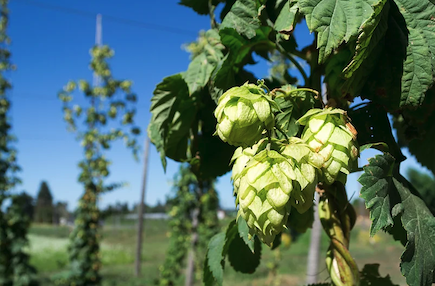The eight super-class terpenes identified by this pinnacle study include alpha-pinene, beta-caryophyllene (BCP), humulene, limonene, linalool, myrcene, ocimene, and terpinolene.
Humulene, also known as alpha-humulene (α-humulene) and alpha-caryophyllene (α-caryophyllene), is one of the most common terpenes in cannabis/hemp/marijuana. This popular phyto-molecule delivers an aroma and flavor that is earthy, woody, and spicy.
This terpene is produced by many botanical species beyond cannabis, including balsam fir trees, basil, black pepper, cloves, coriander (cilantro), elders, ginger, ginseng, oranges, sage, spearmint, sunflower, and tobacco (among others).
Like other terpenes and cannabinoids, humulene features multiple avenues of efficacy and may act as a positive therapeutic agent for a number of disease states, disorders, and conditions. Humulene's potential medicinal benefits include efficacy against systemic inflammation and the hundreds of diseases and disorders involving inflammation.
This terpene has also been found to convey anticancer and offers the relatively unique capability to suppress appetite. This simple characteristic may make this a common molecule of use in the treatment of eating disorders, obesity, and diabetes. Like alpha-pinene, humulene can act as an insecticide (insect repellant).
Peer-reviewed scientific studies have revealed a range of potential positive medicinal outcomes delivered by humulene, including dominant anti-inflammatory, antimicrobial, and anticancer properties.
A study entitled "Synergistic Inhibitory Effect of α-humulene and Sclareol on Human Pancreatic Cancer Cells" that was published in the Journal of Functional Foods reported that the terpene humulene "has been shown to exert anti-inflammatory and anticancer activities.
The research also noted that humulene caused cancerous tumors to shrink in size. The study's authors concluded that humulene "synergistically decreased the viability of pancreatic cancer cells."
A study entitled "Pharmacological and Toxicological Activities of α-humulene and its Isomers: A Systematic Review" that was published in the journal Trends in Food Science & Technology conducted "a systematic review to identify the pharmacological and toxicological activities of α-humulene and its isomers.
The research concluded that humulene presents "potential for the development of new drugs" that treat cancer due to the terpene's "significant anti-tumor and cytotoxic action against cancer cells." It noted that this terpene may also offer antimicrobial advantages.
Read More, Learn More: Higher Learning LV




















